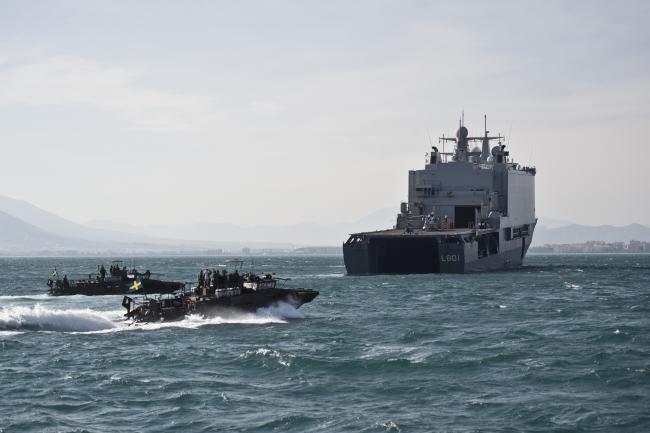On Tuesday 10 February, Royal Netherlands Navy warship, HNLMS Johan de Witt, joined the EU Naval Force. The warship, which is a Landing Platform Dock, will be deployed in the Indian Ocean and Gulf of Aden for three months as the EU Naval Force flagship. It will accommodate the Force Headquarters staff, led by Swedish Rear Admiral Jonas Haggren.
Following an intense period of operational sea training, HNLMS Johan de Witt departed her home port of Den Helder on Saturday 24 January, and following a three week transit, that included a passage through the Suez Canal and Bab-el-Mandeb strait, she arrived in the port of Djibouti.
In the coming three months, Swedish and Dutch forces will deliver a unique contribution to EU Naval Force by sharing their assets. HNLMS Johan de Witt will act as the host platform, carrying two Swedish AW109 helicopters, one Dutch maritime NH90 helicopter, two Swedish CB90 assault crafts, one Dutch landing craft, four fast boats and a Boarding Team.
Speaking about the deployment, Rear Admiral Haggren said “For the next three months military forces from Sweden and the Netherlands will work together to deter pirates from conducting attacks. We will also support other European Union activities that are helping countries in the Horn of Africa region to build their own maritime security capabilities. Importantly, we will also continue to protect World Food Programme and AMISOM shipping as they transit along the Somali coast.”
HNLMS Johan de Witt is a modern, multi-purpose Landing Platform Dock (LPD), capable of accomplishing a wide range of operational tasks. Commissioned to the Royal Netherlands Navy in 2008, the ship has a displacement of 15,000 tonnes, measures 176 metres in length and has a 29 metre beam (width). This is the third time that HNLMS Johan de Witt has participated in Operation Atalanta. Additionally, the warship has been deployed in crisis response, counter drugs and Coast Guard operations.
When deployed as part of EU Naval Force, warships carry out a range of duties, from escorting World Food Programme vessels, conducting counter-piracy patrols and meeting local seafarers to strengthen relationships and gain a better understanding of life along the Somali coast. When in port, the warships also work alongside colleagues from EU sister mission, EUCAP Nestor, to help train local navies in maritime skills.
